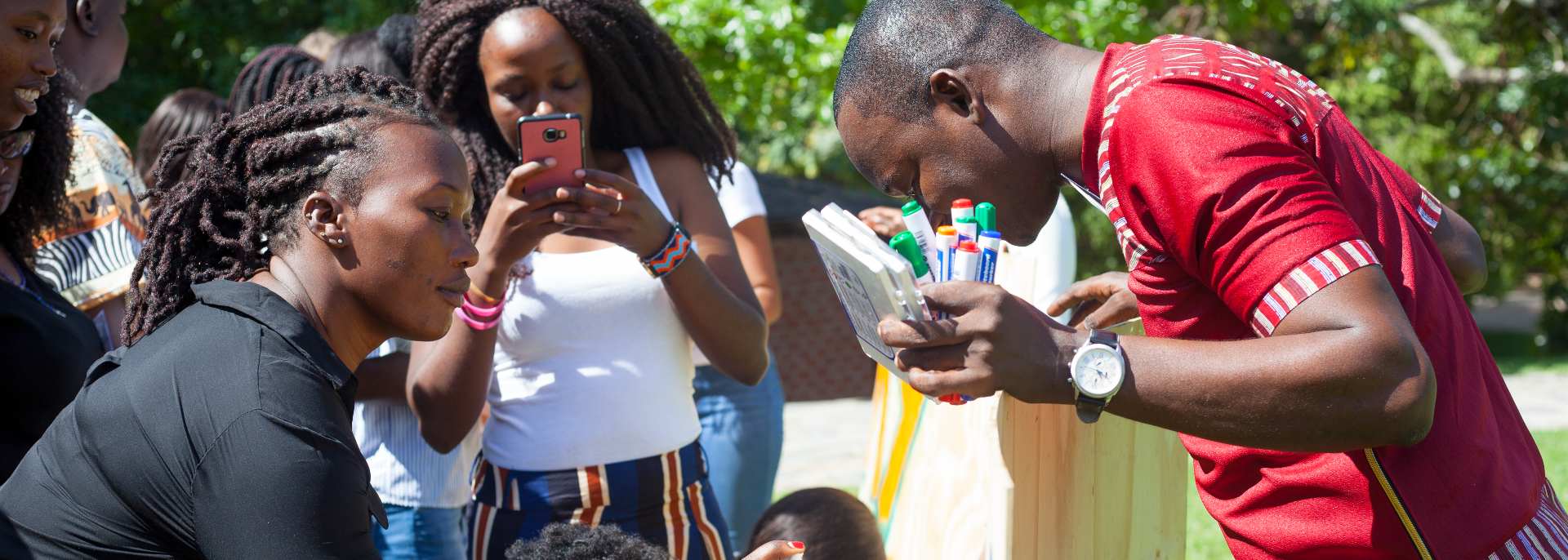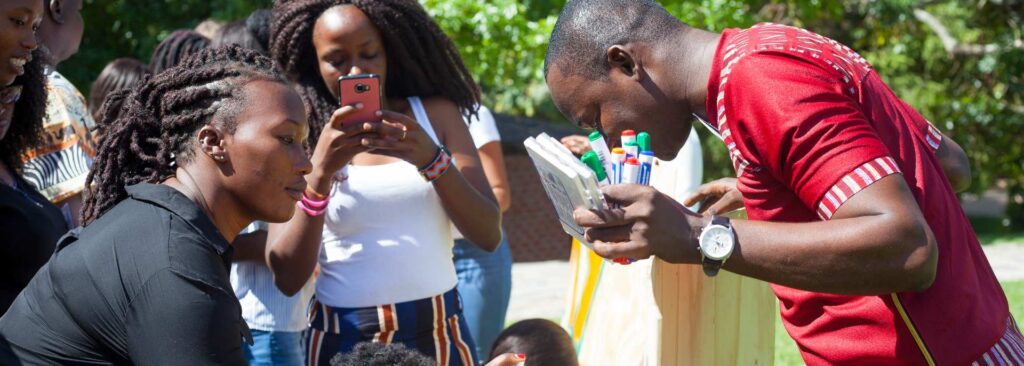We Lead is a new, innovative and powerful program that aims to improve the sexual and reproductive health and rights (SRHR) of young women. It focuses on four specific groups of young women: women living with HIV, women living with disabilities, those facing discrimination, and those affected by displacement. The program puts these young women as rightsholders in the driver’s seat while supporting them to make sustainable changes for their SRHR.
Call for Proposals: We Lead Creatives Grant
Region: Niger
Deadline: October 30, 2022
The program is implemented in nine countries in Africa, the Middle East and Central America. The We Lead consortium which is funded by the Dutch Ministry of Foreign Affairs consists of six civil society organizations: Positive Vibes, Restless Development, Marsa, FEMNET, the Central American Women’s Fund, and Hivos as a lead party. M&C Saatchi World Services s and NANHRI (Network of African National Human Rights Institutions) are our technical partners.
We Lead aims to ensure that the rightsholders play a leading role in strengthened and inclusive organizations and movements that enjoy increased public support and have convinced duty-bearers and health-service providers to take steps towards implementing laws, policies and practices that respect and protect these young women’s SRHR by 2025.
We Lead’s Intermediate outcomes
- Strengthened CSOs are inclusive of or led by young women from four rightsholder groups, and work together in a Community of Action, to defend and promote their SRHR.
- The general public increasingly acknowledges and supports young women’s SRHR.
- Health service providers are more aware of the SRHR needs and situation of rightsholder groups, and increasingly provide accessible, comprehensive, high-quality, inclusive and respectful SRHR information and services.
- Duty-bearers increasingly design, adopt and implement laws and policies that respect and protect the SRHR of young women from rightsholder groups.
Call for proposals
Over the past 10 years, creatives have played an even more important role in stimulating critical conversations in East Africa around socio-cultural issues than before. Hivos through the We Lead program would like to engage a new generation of makers from the creative and cultural sector to produce alternative content that will help in engaging the general public and rightsholders for increased acknowledgement and support for young women’s SRHR and ensure rightsholders better claim for their sexual and reproductive health and rights.
We Lead is now launching a call for proposals for creatives and creative hubs in Kenya, Uganda, and Nigeria, working to produce audio-visual content that sheds light on We Lead rightsholders’ SRHR issues often ignored by society and duty bearers through the following media and more:
- Film
- Creative design
- Music production
- Online
- Content creation
- Photography
- Virtual reality and gaming
- Media
Grantees will receive funding to produce content and also receive business development support to be more self-sufficient, independent, and critical.
This closed call is directed to only initiatives that are currently based in Niger.
Funding information
- The grants that are available range from 15,000 Euros (lowest) to 30,000 Euros (highest) for 8 months for the period starting November 2022 – June 2023.
- Grants may be for the amplification of work already being done in support of creative content production and/or infrastructural needs around the message area mentioned above and as per the project’s outcomes.
- Grants may also be for the creation of new content responding to new developments with regard to rights holders’ SRHR issues.
- The grant is not able to fund the provision of direct services or operating/running costs unrelated to proposed activities as outlined in this call.
What do we wish to fund?
Proposals with innovative project ideas that promote an increase in knowledge about SRHR information and public and decision-makers support for the following We Lead rightsholder groups:
- Young women living with HIV
- Young women with disabilities
- Young women who identify as lesbian, bisexual, trans, queer or intersex
- Young women that are affected by displacement
We Lead has a strong preference for projects that are designed from an intersectional point of view (You may want to define intersectionality in the context of the project).
This call is primarily directed to
1. Entities that represent communities of makers and audio-visual content creators such as but are not limited to the following;
-
- Creative spaces
- Groups of artists
- Music studios
- Hubs
- Cafés
- Art spaces
- Art galleries
- Independent production houses
- Networks of artists and producers
2. Entities that produce or intend to produce content/work that aims to shed light on socio-political issues that are often ignored by society therefore challenging or questioning certain norms in society. This content/work should enhance public debate by enabling alternative viewpoints to mainstream societal narratives.
3. Entities that intend to do collaborative work in support of the creative arts sector and work with content producers in one or more of the following audiovisual sectors:
- Graphic design
- Comics / cartoons
- Animation
- Poetry / slam poetry / spoken word
- Storytelling
- Music
- Rap / Hip hop
- Radio shows/ radio series/ podcasts
- TV show / TV series/ online channels
- Short film / video
- Feature film / documentary
- Vlogging
- Visual art (painting, drawing, printmaking, digital art)
- Mixed media installations
- Performance virtual reality
- Videogame
4. Entities that incorporate new ways of working cognizant of the restrictions introduced by Covid-19
Project activities should aim to
- Develop, roll out and manage online platforms for SRHR information.
- Develop, roll out and diffusion of media content (video, films, documentary, for SRHR information sharing with the rightsholders that are interactive and engaging).
- Create awareness of rightsholders SRHR to influence their direct environment, influencers and societal leaders on SRHR for the rights holders using online platforms.
Who do we wish to fund?
Characteristics of organizations to be engaged and involved in We Lead:
Organization and leadership
- Working from a human rights-based approach is an asset.
- Being open to engaging, coordinating and working with others on rightsholders’ SRHR and promoting youth leadership to flourish and grow.
- Led by rightsholders or have rightsholders in a leadership position.
- Led by young persons or have young persons in a leadership position (below 35 years).
- If the organization is not led by rightsholders nor by young persons ‘in general,’ they should demonstrate a track record as well as current experiences in actively promoting youth leadership, particularly the leadership of young rightsholders.
- A progressive, inclusive and feminist standpoint on SRHR and particularly SRHR of rightsholders, which is embraced by the organization’s leadership, is an asset.
Finance and Administration
- A locally registered and well-respected non-profit or for-profit entity in terms of the law, with a solid track record and strong financial-administrative capacities.
- Have a transparent organizational structure and financial-administrative system in place.
- The applying entity must have a bank account in its own name with at least two signatories.
- The applying entity must have a tax clearance certificate from the relevant tax authority in the country of origin or operation.
- The applying entity must provide proof of a sound and up-to-standard financial accounting system that meets the requirements of global best practices.
- Proof of all the aforementioned is a requirement.
How the proposals will be reviewed and processed
The following steps will be undertaken by Hivos to review the proposals and determine the awarding of grants:
Step 1: Submission of proposals. Deadline is 30th October 2022 at 11:59 p.m.
Step 2: Review and selection of received proposals by the Hivos grants selection committee: to be completed by 5th November 2022 (Grant recipients will be notified shortly after).
Step 3: Capacity assessments review of selected applicants on organizational and financial eligibility: 10th November 2022.
Step 4: Contracting: 20th November 2022, onwards.
Format of proposal
- Applications must be submitted in written English
- The proposals must be not more than five pages (this does not include the budget or applicable annexes) with the following sections:
Applicant details
- Name of the entity, focus country/countries, and representative that will sign the agreement if the grant is awarded. This includes contact details such as e-mail, phone number, and address.
- Start and estimated end date of the project [8 months].
- Short description of your work/ practice and the mission of your organization.
Your project
- Brief description of the project or activity for which funding is sought, including how the project is going to contribute to We Lead’s project outcomes on advancing SRHR for the rights holders. (What SRHR issue is your project addressing and what narrative is it countering or projecting).
- A brief outline of planned activities of your project: What, for whom, when and where. Please provide target numbers where possible.
- Project schedule, time frame, or step-to-step list.
- Full budget in Euros using the prescribed budget template.
- Please explain in what way(s) you plan to amplify your work (organizationally, reaching new audiences, etc). Please describe what mechanisms will be used to disseminate the content that will be produced; include evidence of existing platforms e.g. social media
- How will you be able to demonstrate or measure your achievements?
About your work
- Short description of your work/ practice and the mission of your organization.
- Two examples of a previous creative work that was produced by you or one of the members of your organization that provides alternative points of view on issues affecting society and that challenges or questions a certain norm in society.
- Include a link to an online platform where the previous work has been posted and viewed.
- Audience reach at the time of application: Outline your choice of channels, online engagement/followers (numbers), and the demographic of the audience. If possible, please mention a) where your audience is geographically (capital / non-capital, high-density area, rural area), b) to what extent marginalized groups and which groups are represented, and c) the share of women.
- Size of the maker community at the moment of the application. This includes people to who you provide services, and/or people who take part in the production. Please mention the percentage of women and people from marginalized communities, as well as their geographical location (capital / non-capital, high-density area, rural area).
Format of Budget
Interested applicants should submit a detailed budget, in Euros, using the template attached in the link below:
https://docs.google.com/spreadsheets/d/1qixth7xDn9UuRXfOJh7M7DAuPMtmEcVJ/edit?usp=sharing&ouid=112445935933877565605&rtpof=true&sd=true
Annexes
- Organization registration documents – certificate of registration, deed etc.
- Tax compliance certificate.
How to apply – submission of proposal and deadline
Applications must be submitted to GrantsEA@hivos.org with the subject ‘We Lead 2022-2023 application for creatives – ‘Name of Entity/Organisation/Country’ by 30th October 2022.
Feedback and announcement
Recipients will be notified after the application review process is complete.
Note: All grant funds must be used to further creatives’ endeavors. Recipients will be asked to provide an accounting of the use of funds and expenses without supporting evidence will be disallowed.


